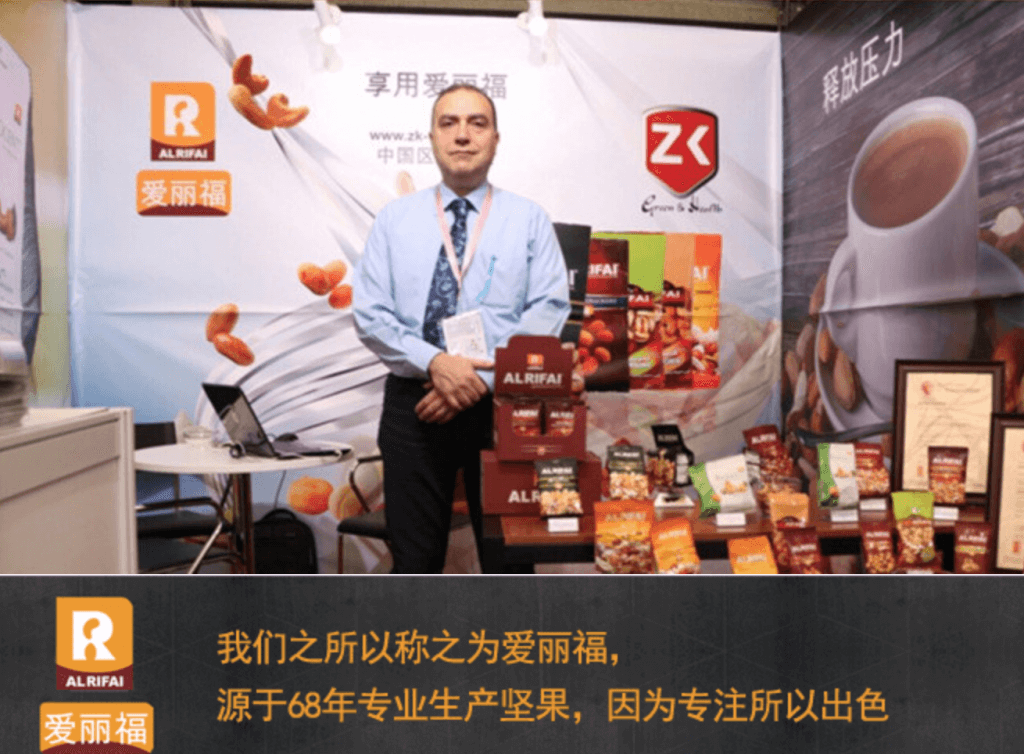It’s easy to assume that industries and goods that aren’t obviously dangerous, like mixed nuts, confectionaries, and chocolate, are safe from exposure to sanctions risks. However, illicit actors may operate across multiple sectors, some of them innocuous. A Lebanese mixed nuts retail firm underscores the importance of conducting thorough due diligence checks regardless of the industry or perceived sanctions risk.
Marketing materials for Al Rifai Roastery SAL list Chinese company Guangzhou ZK Trading Co., Ltd as an authorized seller. The U.S. Department of the Treasury has sanctioned the owners of Guangzhou ZK Trading, Zhou Yishan and Amir Katrangi. According to the U.S. Treasury, they procured U.S.-origin electronics on behalf of Syria’s Scientific Studies and Research Center (SSRC). This procurement network has nodes in the United States, Hong Kong, China, Lebanon, Syria, France, and the United Kingdom.
Al Rifai Mixed Nuts
Al Rifai Roastery SAL, a mixed nuts producer and retailer headquartered in Beirut, Lebanon, boasts 200 stores across 23 countries worldwide. Given the size and global reach of this company, we can expect that it may have appointed many distributors around the world to sell the Al Rifai brand in local markets. In China, Al Rifai marketing materials list Guangzhou ZK Trading Co., Ltd as one of its local distributors.
Chinese Public Records Reveal Potential Sanctions Risk Exposure
Chinese corporate records for Guangzhou ZK Trading reveal that Chinese citizen Zhou Yishan is the company’s manager and legal representative while Lebanese citizen Amir Katrangi is its 50 percent shareholder and director.
On July 25, 2018, the U.S. Department of the Treasury sanctioned five companies and eight individuals for supplying electronics used to produce weapons of mass destruction to the Scientific Studies and Research Center (SSRC), including Zhou Yishan and Amir Katrangi. The SSRC is a Syrian government agency that has developed chemical weapons for the Syrian government.
A federal indictment indicates that Katrangi procured U.S.-origin toggle switches through Electronics Katrangi Trading (EKT), a Lebanon-based electronics supplier managed by Katrangi and his family. These toggle switches are used in the construction of improvised explosive devices (“IEDs”). Such devices have been used against U.S. and coalition forces in Afghanistan and Iraq.

Fig. 1: Amir Katrangi appears in marketing materials for Al Rifai and Guangzhou ZK Trading
Amir and his brothers Maher Katrangi and Houssam Katrangi are founders and shareholders of EKT, according to Lebanese corporate registration records. (The United States also sanctioned Maher and Houssam in July 2018.) EKT maintains offices around the world, including in Syria, Lebanon, the United Kingdom, and China.
Conclusion
Al Rifai was likely unaware that the owners of its distributor are subject to U.S. sanctions. Moreover, it’s even more likely that Al Rifai did not suspect these individuals of supplying Syria’s SSRC with electronics that terrorist forces could be used to construct IEDs. This case underlines the importance of conducting thorough due diligence checks, even in the absence of any obvious red flags.
Roasted nuts are not a product traditionally associated with financial crime or terrorism. The Katrangi network demonstrates the growing creativity of illicit actors in funding and concealing proliferation networks. For entrepreneurs and business executives, understanding these innovative methods is critical to preserving the integrity of a company’s supply chain.
The public records data used to power this research is available through Sayari Search! If you’re curious how this data could drive insights for your team, please reach out here.